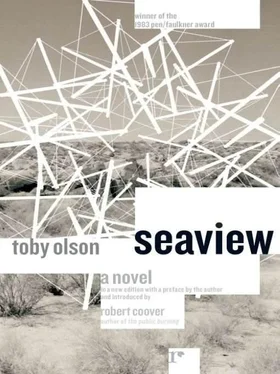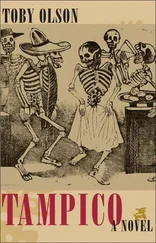“I got what I wanted,” he finally said. “Now let’s finish this hole!”
Only Allen knew immediately what the Chair meant. Campbell and Costa seemed a little bewildered, as if they had forgotten why they were there, in golf carts, halfway down a fairway. Melinda was already, in her different nature, slightly separated from any events. Allen stepped out of the cart, and as none of the others moved, he spoke.
“Okay, I’ll hit then.” He walked over to where his ball was, stood back ten feet behind it, sighting along the line. Because there was no other movement, the others watched him.
The ball sat five feet down from the entrance into the rough running along the fairway toward the green. It was on the flat, and he would have a good place for a stance. He was about a hundred and sixty-five yards from the front of the second green; the pin stood twenty-five or so feet back to the right and on the high side of the slope. He figured he could go straight at the pin with a wedge, get it to bite and pull up quick. The green had begun to glisten; the rain, though the drops were still infrequent and far apart, was steady now and real. The drops were large, and he figured that the green had softened a little already. The shot gave him nothing interesting to negotiate. He turned and went back to the cart, grabbed the head of his eight-iron, and pulled the club free of the bag. When he got behind the ball again, he looked up the groin of the slowly dampening fairway and thought about the lines.
The lines were best when they arced. There were lines in the air and lines on the ground. The lines on the green were visible to anyone when it rained. You could retrace the putt after it was finished then. The ball would make a kind of trough, pushing the drops to either side in its roll and bending the wet grass down before it. When the rain had been heavy, a small rooster tail of water would rise up behind it, and as the tail shrank the ball would slow in its pace, and when it stopped the tail would stop. And then there would be a trail like a snake left behind when it had passed through sand. You could see every detail of the breaks the ball had negotiated, how it had fought against them or rolled comfortably with them when the pace was right, taking it to finish somewhere near the hole or in it. If you watched long enough, the trail would begin to disappear as the grass rose up again in the trough and the rain fell. It would leave the surface of the green in increments, starting from where the head of the putter had rested, the end of its tail becoming faint and slowly vanishing as you looked up it toward the hole or the final resting place of the ball near it. It could be almost as if the movement of your eye along the line registered and then canceled it, until, when your glance reached the presence of the ball or the absent place in the green where the hole was, there was no longer any use for the line, and it was gone.
But this was for anyone to see, and for him it was the lines in the air, the gentle and hooked arcs and graceful fadings and dips, that gave him better pleasure. He felt it as a kind of geometry he could trace back to his body, and when things were exactly right, he knew it was an actual aura emanating from him, and in that extension beyond his body he experienced a unique kind of power. At least he thought of it as unique, felt that there was enough difference in it, though he had heard that archers knew of a similar thing. The line would start out in the bundle of hiss that sat in the muscle of his heart, that tangled and self-regulating system of twisted and complex nerves which made the heart go and in turn extended its influence, making his whole body operate.
After the planning, but before the hit, it was as if the bundle of hiss tensed a little, became a different kind of system and potential. It was as if it became one continuous long nerve coiled in the flesh of his heart. It was as if it unraveled slowly, sending itself like a catheter into a pulmonary artery and from that to the brachial and down into the wrist of his left arm and into his thumb, where it pressed into the grip of the club. And a moment before the club face struck against the ball, and as the ball itself seemed to swell in that way it did, reaching out to the club face to touch it, the visible letters on the Golden Ram sharpening in their outlines, it was as if a small hole opened in the end of his thumb and the tip of the nerve came through and there was a kind of synapse, an electric arcing, between his thumb and the ball, and the arc continued into the air when the ball shot off the etched surface of the club face, and the lines began. It was not an unraveling. It was as if the air were a surface on which the ball could trace and map its path, but it looked like a filament of gold or silver, depending on the place of the sun, and it stayed and marked its arc until the ball had descended and found out its resting place. He felt, at certain special times, that the line was somehow part of his body and that his influence throbbed along the line and was connected to the ball until the shot was finished, when the ball came to rest.
He moved up to the ball and got slightly down in his stance and addressed it. He had decided on a half eight, a slight punching fade, to take the ball low and left, then bring it back right so that when it hit in the apron it would be coming in on an angle from the left and would have some side spin in it. That
way it would roll up the hill toward the right back of the green where the pin was. He figured it would stop close and would get them their eagle. He shifted his feet, lifted the club head from the ground, then replaced it, then did that again, sighting his line in, picturing the filament he expected to come this time. Then he brought the club head up in a half backswing, began the slight hip-shift toward the green, brought the club down and through, dug into sand in the crude fairway in front of the place where the ball had been, and the force of the swing brought the club through and up.
His head was pulled up by his arms; he looked to see how the ball flew and caught sight of it when it was already a good fifty feet from him. Then the line began to materialize, silver this time under the dark cloud cover. The ball, etching the line, reached its apex and then began to descend, turning its arc to the right and in toward the green. But his eyes stopped at the apex, and they widened. There was another line there, this one a dirty white, and it cut across the top of the arc, dividing the air above the fairway from high rough on the left to an equally high place on the right. His concentration broke. He quit watching the ball, got up from his stance, and turned to the others, but he kept his club head in the air and pointed with it.
“There’s another line,” he said. They did not know what he meant at first, but then Campbell saw it too, and he pointed.
“There!” he said. And when the others saw it, it was shaking and whipping slightly, and their eyes followed along it to the right, and they saw some rustling in the scrub high up in the rough, the kind of movement a small animal would make or a large bird foraging. But the thing happened too fast for them to judge the movements. The bird leapt up from the brush so quickly it seemed to materialize in the air a few feet above it. Like a great hawk, or an osprey, or an eagle even, it danced and fluttered on stiff wings, and the absence of the glare of sunlight or the backdrop of shadows was such that they could see it very distinctly. It was not a bird at all but a small man with wings. His face was in profile, his chin up and his jaw-set, arrogant, but austere in its stillness. He wore a feathered headdress and fringed shirt and trousers, and in his small right fist he carried a tomahawk. He dipped down a little and then rose quickly as the line connected to him snapped taut. Then they heard the rustle in the paper as the high breeze above the still fairway caught him, sending him higher.
Читать дальше












